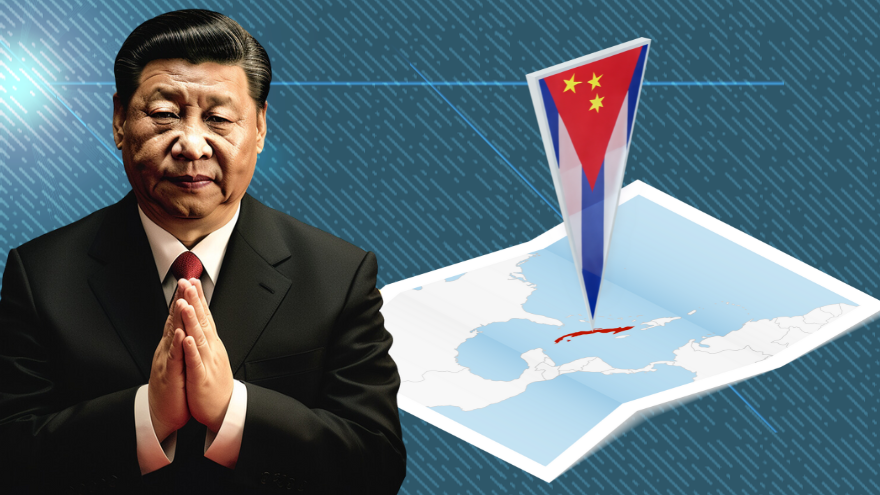China has reached a tentative agreement to establish a secret military base in Cuba.
The electronic eavesdropping facility will allow Chinese intelligence services to intercept communications throughout the southeastern U.S. where many military bases are located, U.S. officials familiar with the highly classified intelligence told the Wall Street Journal (WSJ).
Reports of the joint venture between the two communist nations have sparked alarm within the Biden administration because of Cuba’s close proximity to the U.S. mainland. Cuba is only about 100 miles from the Florida coast.
“While I cannot speak to this specific report, we are well aware of—and have spoken many times to—the People’s Republic of China’s efforts to invest in infrastructure around the world that may have military purposes, including in this hemisphere,” said John Kirby, spokesman for the National Security Council. “We monitor it closely, take steps to counter it, and remain confident that we are able to meet all our security commitments at home, in the region, and around the world.”
China has agreed to pay Cuba several billion dollars for the base, WSJ reported, which would allow the Chinese Communist Party (CCP) to monitor a range of communications, including emails, phone calls, and satellite transmissions. Construction of an advanced Chinese military base in close proximity to the U.S. is almost certain to be viewed as a new threat.
Over a 15-year period, China courted Caribbean nations in a bid to expand its global footprint by providing more than $6 billion in low-interest loans for infrastructure and other projects.
Cuban governments under Fidel and Raul Castro, as well as Miguel Diaz-Canel, have maintained regular military interactions with China, while also holding talks pledging to strengthen defense cooperation between the two nations.
A Second Cold War
Steve Yates, Chair of the China Policy Initiative who has previously served as an analyst at the National Security Agency (NSA) and as a White House Deputy Assistant for National Security Affairs, says that the budding strategic partnership between China and Cuba echoes the Cuban Missile Crisis and could trigger a new Cold War.
“For a very long time China has been very aggressive about engagement in Central America, Latin America, the Caribbean, in part to try to lure away, or bribe away, the remaining allies of Taiwan and the international community. And then they’ve also doubled down in recent decades in the pursuit of economic engagement, supply chain issues, ways of getting around US trade restrictions,” Yates told Timcast in an interview.
He explained that China building out a security presence on the island is something that has been heard about for some time, but downplayed by the U.S. intelligence community.
“It seems to me that with this recent report that China is engaging in a Cold War 2.0 and going as far as the Soviets had hoped to go with Cuba trying to get close to America’s shores,” Yates said, while adding that U.S. attempts to normalize relations with the communist state have not solved our strategic problems with its government.
“They seem to find common cause with China, Moscow, Tehran, all of the ‘axis of do-no-gooders’ around the world. I just see this as part of that same tapestry,” Yates continued. “The main wrinkle is that [Chinese President] Xi Jinping is guns-a-blazing bold going after the United States in not responding to [President Joe] Biden’s wish for a cooling of temperatures and falling of relations as he talked about when he was in Japan at the G7.”
During last month’s meeting of seven of the world’s richest nations, Biden told reporters that the G7 was not seeking to “decouple from China,” but was simply “looking to de-risk and diversify our relationship with China.”
Concerns over China testing the Biden administration’s resolve to challenge the CCP were reignited months before, when China sent a spy balloon that was tracked over the Aleutian Islands in the Pacific Ocean, yet was allowed to travel across the entire continental U.S. before being intercepted and shot down by the U.S. military six nautical miles off the coast of South Carolina.
“They feel like they can act with impunity, because for the most part they have been able to do so,” Yates said. “Even if you just take the spy balloon ‘plural’ — it was actually more than one balloon — the president most recently talked about a single balloon not really being that big of a deal. But it was a big enough deal to spend probably a couple million dollars to shoot down once it got to the Atlantic.”
Yates added: “It’s pretty clear if you’re sitting in Beijing that you can poke, and prod, and torment your American counterparts. You can bark at them Wolf Warrior-style all you want. You can take the Antifa talking points and bark them back at American officials. And all you get is a whimper and a wish for dialogue from the Biden White House and State Department. … The CCP can’t be entirely wrong to think, ‘You know, we can get away with whatever we want.’”
A Signal To the U.S. Over Taiwan Policy
Other scholars of Chinese political and military affairs also see parallels with Cold War policy, and believe construction of a Chinese-owned base on Cuba may be an intentional provocation over the issue of Taiwan reunification.
“From one point, of course, it brings back memories of the Cuban Missile Crisis where the Soviets were moving nuclear weapons to Cuba, because Cuba is basically a launching pad into the United States — it gives them the ability to attack us more,” Joshua Philipp, an investigative reporter and China policy expert, told Timcast in an interview.
“So that was the whole issue with the Cuban Missile Crisis. You could argue that Ukraine was the equivalent of the Cuban missile crisis against Russia,” he continued.
“The U.S. was moving military assets to Russia’s border. The Chinese Communist Party accuses the U.S. of doing that to them through Taiwan,” Philipp explained. “And so you could argue it’s a tit-for-tat type thing.”
Given that China may seek to ignite a war with Taiwan, Philipp said, the CCP may be looking for a visible military operation that would create some kind of comparison between Taiwan and Cuba, which they can use as a narrative.
The U.S. military has bases and strategic assets littered throughout the Indo-Pacific region within a short range of China. In 2021, the U.S. nearly doubled the number of military personnel stationed in Taiwan. The Philippines recently released a map showing four new bases close to Taiwan that the U.S. military will be able to access, which analysts say is meant to contain China.
Advanced Espionage
For years, China has used various means to conduct espionage operations, including Wi-Fi networks, compromising computer chips installed in devices used by U.S. companies and governments, spy balloons and more.
But, part of the desire to construct a base in Cuba could be to establish a way to obtain information that they are somehow unable to collect through all of their established means of spying.
“Maybe there’s something they’re trying to monitor that they cannot get through all the other means they have,” Philipp said. “And it is very possible that they could build a very large surveillance facility in Cuba and use it for whatever that purpose is. There might be a reason there that we’re not being told what the CCP might be trying to get that it cannot get through all of these other means, through cyber attacks, through spies, or through normal types of electronic surveillance that they already have in place.”
Offensive Weaponry
China, which is about 8,500 miles or 7,400 nautical miles away from Cuba, would almost certainly need to deploy advanced weaponry to defend a multi-billion dollar installation located within a short hop from the continental U.S.
However, the base could also shelter offensive weaponry that could be used to target America, either in response to a U.S. attack or as a first strike.
Doing so would be a “complete echo of the Cuban Missile Crisis,” Yates said.
“There has to be some consideration of that possibility, but that would be among the most provocative things China could do from Cuba,” he added. “And if they move in that direction then it means we’re not in a Cold War, we’re in something that’s more dangerous than the Cold War was with the Soviet Union.”
Philipp acknowledged there is the possibility that China could install major weapons platforms on the island of Cuba to use against the U.S., adding that slowly scaling up their offensive capabilities would be similar to what they’ve already done in the South China Sea.
“And so they started building artificial islands and then they’re like, ‘Oh, we need to defend these artificial islands.’ So they start building military structures,” Phillip remarked. “And the next thing you know, they’re building missile defense systems on these artificial islands. And then, pretty much full military facilities. They weaponized them over the course of time.”
China has been scrambling to develop hypersonic missiles that travel at a speed faster than Mach 5, and maintain a high degree of maneuverability, making them nearly indefensible.
Launched from Cuba, a nuclear-capable hypersonic missile would be able to strike Miami in about five minutes.

